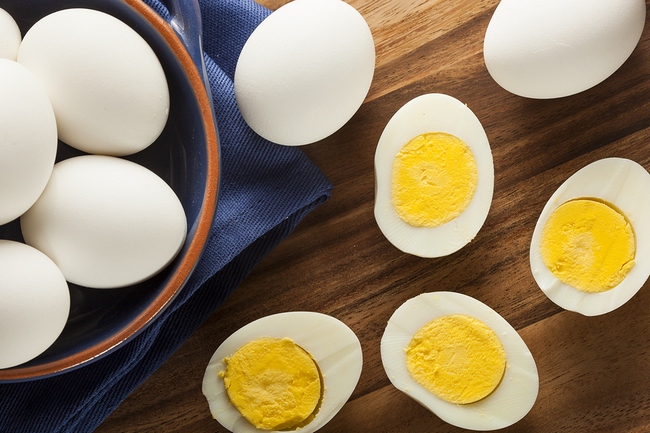- Make It Yourself Lavender Heart-Shaped Bath Bombs!
- 20 Things You Never Knew About “Down There”
- 12 Best Foods For Those Suffering From Arthritis Pain
- 12 Personal Hygiene Mistakes Almost Everyone Makes (Mom Never Told You About #4!)
- 15 Medicinal Plants And Herbs From The Cherokee People
- 12 Mind-Blowing Benefits Of Drinking Coconut Water During Pregnancy
- 12 Outstanding Winter Foods That Won’t Fatten You Up Like A Christmas Turkey
The Truth About Egg Yolks

Photo credit: bigstock.com
For decades, eggs have been demonized by the doctors, nutritionists, and the government as the quintessential unhealthy food. Why? Because eggs filled with that dietary horror of horrors known as cholesterol. Together with saturated fat, which eggs are also rich in, cholesterol was blamed from everything from obesity to increased risks of heart attacks, strokes, and more. Any food that contained one of these substances was placed on the nutritional no-go list. Since eggs were so rich in both, they were singled out as a good to avoid with such fervor that it’s amazing global warming wasn’t somehow attributed to the consumption of eggs, and egg yolks in particular.
The truth is that eggs are arguably the most perfect food in nature, and one of the most nutritious food items you can eat. In this article we’ll explore how all this misinformation about eggs came about, the health benefits of eating eggs, and how to know you’re picking the right eggs to get the most nutritional value.
How did eggs get such a bad reputation?
The origins of the “cholesterol and fat = disease” mindset can be traced back to the early 20th century, when a German scientist named Rudolph Virchow developed his “Cholesterol Theory,” in which he theorized that fat consumption via diet was the source of clogged arteries and led to an increased risk of coronary disease. The idea exploded in popularity with the publication of Dr. Ancel Keyes’ “Seven Countries Study” in the 1970’s which furthered this argument.
The Seven Countries Study paper was a watershed moment in American nutritional knowledge. Dr. Keyes cited data detailing the link between dietary cholesterol and increased coronary disease. This, along with several similar studies performed in previous years, convinced the overwhelming majority of the medical establishment that food rich in cholesterol and saturated fat were the worst thing a person could eat. Thus the anti-egg campaign began.
The problem is that Dr. Keyes committed some sins of omission of which not many people are aware. Studies exploring a possible link between dietary fat and clogged arteries had actually been conducted in 22 countries, but only seven showed a correlation between fat consumption and arterial obstruction. The studies in other countries either showed no clear connection or actually a decrease in cholesterol levels! Of course, those studies didn’t make the cut to be included in the “Seven Countries” paper.
Continue to Page 2

Photo credit: bigstock.com
The Truth About Cholesterol, Fat, and Eggs
Here’s the truth about cholesterol: Taking in fat through your diet doesn’t make much of a difference in your blood cholesterol levels. Approximately 75 percent of cholesterol in your body is produced by your liver, which means that even if you stopped eating anything with cholesterol in it, your body would still continue to produce its own.
“Since we cannot possibly eat enough cholesterol to use for our bodies’ daily functions, our bodies make their own. When we eat more foods rich in this compound, our bodies make less.” argues Dr. Chris Masterjohn in his article for cholesterol-and-health.com. “If we deprive ourselves of foods high in cholesterol — such as eggs, butter, and liver — our body revs up its cholesterol synthesis. The end result is that, for most of us, eating foods high in cholesterol has very little impact on our blood cholesterol levels.”
You read that right. Eating less cholesterol can cause your liver to compensate by producing even more on its own.
The medical establishment is finally waking up. In 2015, the US government removed eggs from its recommendation of a 300 mg daily limit for dietary cholesterol.
Now, this doesn’t mean you should just pig out on cake or eat 20 eggs a day. Too much of any one thing is unhealthy. But what it does mean is that whole eggs are NOT bad for you. Take all that nonsense you’ve heard about the evils of egg yolks and throw it away.If you want to order an egg white omelet, fine. But don’t feel like you have to in order to be healthy.
Continue to Page 3

Photo credit: bigstock.com
The Benefits of Eating Eggs
Now that we’ve cleared the air about eggs, let’s break down all the incredible benefits this food has to offer.
- Packed with vitamins. Eggs are a great sources of vitamins A, D, E, and K. Egg yolks in particular are very rich in vitamin B12. Egg yolks are one of the richest sources of this essential B vitamin, with a single yolk containing a whopping 215 mg. Choline is a precursor to acetylcholine, aneurotransmitter which controls memory and muscle control. Eggs are literally brain food! You’ve probably already experience the effects of choline deficiency; is linked to “brain fog” and low energy. It is estimated that 90 percent of Americans are deficient in choline, and similar number likely found across the industrialized world.
- Eggs help your vision. Eggs contain two organic pigments (caretnoids) called zeaxanthin and lutein. These two compounds play a role in eye pigmentation, protecting your central vision. They also have antioxidant properties and protect your eyes from free radical damage.
- Eggs make you strong. This is common knowledge, but it bears repeating: Eggs are a fantastic source of protein. In fact, eggs are among the most bioavailable sources of protein you can eat! It’s no wonder that eggs have been a staple of athletes’ diets for decades (in spite of all the anti-egg propaganda). A typical egg usually has around six grams of protein.
How to Pick the Best Eggs
Not all eggs are created equal. Always chose pastured or organic eggs whenever possible. Mass-produced eggs from factory farms are laid by hens in overcrowded and unsanitary conditions. These hens are usually caged and fed cheap grain packed with antibiotics to prevent them from getting sick. Studies have shown that these eggs have lower nutritional value in all departments than eggs from pastured hens.
Pastured means the hens were allowed to forage outside at least part of the time for their natural omnivorous diet of grasses and insects. These hens produce eggs which are of much higher nutritional value. Local farms or health food stores are usually the best place to look for these high quality eggs.
There is one more guideline you can use to determine if you have good eggs or low quality ones: the color of the yolk. Factory-farmed eggs from caged hens have yolks with a pale, yellow color. Many people think this is the normal color of egg yolks, but this is not the case.
However, if the yolks are more deep orange color, it means that the hen which laid that egg had access to a healthier diet, and that the resulting egg will be much healthier for you.
READ ALSO: True Facts About Eggs Infographic
The bottom line here is that eggs are good for you, and they are an excellent source of vitamins, protein, and good fats. Combined with a healthy overall diet and lifestyle, you’d be foolish not to include eggs in your superfood arsenal.
References:

































Anto
Sep 29, 2016 at 7:27 am
On the other hand, eggs are an unnatural food in that hens have been genetically modified, through selected breeding for decades, to produce birds which lay way more eggs, something like 20 times more, than any wild birds. Their ovulation cycle has been unnaturally accelerated so that the hens’ oestrogen levels, and hence the levels in the eggs, are unnaturally high.
This explains why egg consumption correlates with incidence of hormone-sensitive cancers in humans. Men with elevated blood-PSA levels should exclude eggs, and for similar reasons dairy, from their diet, as studies have shown a positive correlation between their consumption and incidence of aggressive strains of prostate cancer.